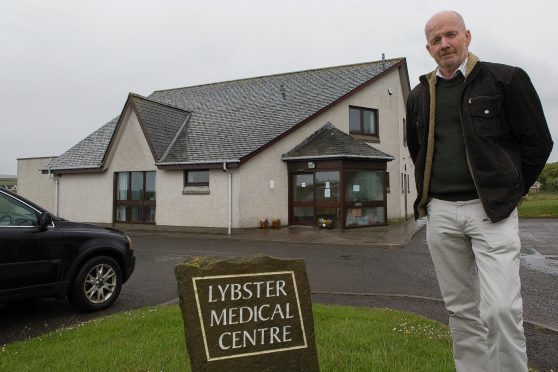NHS Highland was under fire last night as plans for a radical shake-up of healthcare in the north emerged.
In a bid to solve GP recruitment problems in Caithness – similar to those in many other Highland and island communities – the health board
has revealed new plans to pool services between three surgeries.
The plans to share both medical and non-medical staff between Lybster Medical Centre, Riverview Practice in Wick and Riverbank Surgery in Thurso were described as a “sticking plaster” approach by critics.
The three surgeries are all run by NHS Highland and the move is in part because of longstanding difficulties in recruiting GPs in Caithness.
But sources close to the Lybster practice have suggested that the two GPs currently working there have been “unsettled” by the proposed changes.
Jim Macgregor, chairman of Latheron, Lybster and Clyth Community Council, said the area feared losing a practice which is currently “second to none”.
He said: “Our main concern is that if the doctors are asked to cover elsewhere then they might choose to leave Caithness altogether.
“The doctors are contracted to work in Lybster and shouldn’t be expected to spread themselves thinly to solve problems everywhere else.
“We currently have a medical centre which is the envy of others.
“It is a first class facility and we don’t want anything to happen that is detrimental to the service we currently have.”
Mr Macgregor said there were a number of concerns about the plans locally, including outstanding questions over whether patients would potentially have to travel to see their doctor or whether it would lead to a change in the number of clinics available.
Lybster and Wick are 13 miles apart, Wick and Thurso a 20-mile drive and Lybster to Thurso 27 miles.
The merger proposal is at an early stage, with GPs and practice managers holding a meeting in Wick on Monday to discuss it.
The surgeries in Wick and Thurso are considerably larger than Lybster and regularly use locum doctors as cover.
It is understood that staff would be shared across all three practices as cover.
The boss of NHS Highland has urged communities across the north to show “courage” as he unveiled his vision for a radical shake-up of health services.
In March, health board chairman David Alston outlined proposals to create an entire “new profession” of highly-skilled care workers to ease pressure on GPs and nurses.
According to government figures released last year, the Highlands had a total of 391 GPs in post in 2015, down from a high of 420 in 2009.
Changes decided last year mean there will no longer be locally-based out-of-hours GP cover in Lochaline in Morvern, Glenelg and Arnisdale in Lochalsh, Applecross in Wester Ross, and Lochinver, Armadale and Tongue in Sutherland.
Yesterday, a source close to the Lybster practice said staff could essentially become “interchangable”.
They said: “It’s a very different type of practice.
“In Lybster they know all their patients, where in Wick and Thurso that’s just not possible.”
Councillor Nicola Sinclair, secretary of the Caithness Health Action Team, said she was concerned that NHS Highland was “playing with communities”.
She said: “It’s time for them to find a more sustainable, long-term solution.
“This sticking plaster approach to solving problems is not helping.”
A spokesman for the health board described the process as a “collaborative working project” aiming at meeting changing health needs of the communities by sharing best practice and ensuring continuity of care.
He added: “The three practices involved will continue to operate from the existing sites.
“The aim of the project is to improve access to the extended primary care team across the three areas to ensure that people can see the right person at the right time.
“NHS Highland is keen to build a sustainable, high-quality primary care service in Caithness, and has an obligation to ensure that all resources are used to best effect.
“This is particularly important in areas where we have difficulty in recruiting GPs such as in Caithness.
“NHS Highland is committed to build primary care models where GPs are supported by a team of trained professionals such as nurse practitioners, practice nurses, pharmacists and receptionists.”
He added that NHS Highland will continue to advertise for GPs, and similar approaches taken in other areas had proven successful.
He added: “This model of practice management is working very effectively in other areas of Highland and we will be working with the practice team to ensure all staff are informed and involved.”
